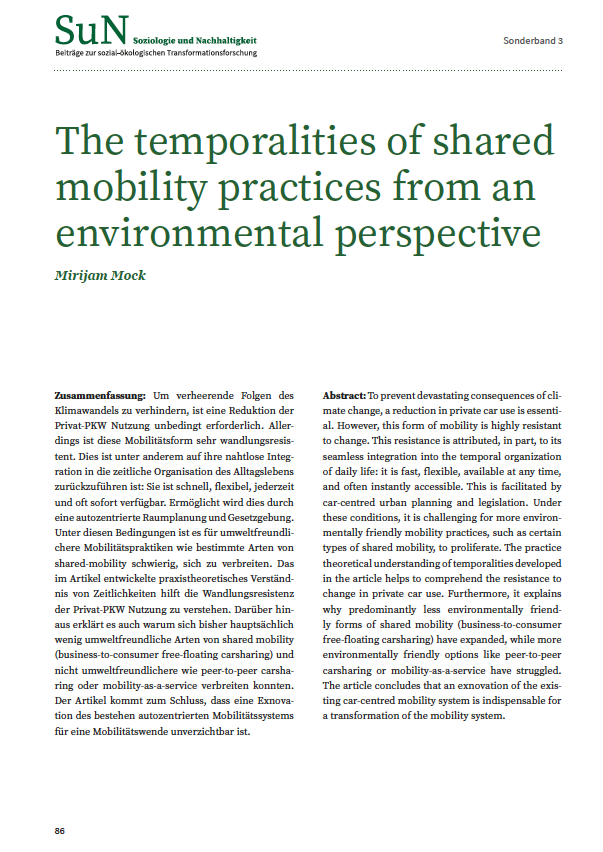The temporalities of shared mobility practices from an environmental perspective
DOI:
https://doi.org/10.17879/sun-2024-5272Schlagworte:
shared mobility, sustainability, practice theories, carsharing, timeAbstract
Um verheerende Folgen des Klimawandels zu verhindern, ist eine Reduktion der Privat-PKW Nutzung unbedingt erforderlich. Allerdings ist diese Mobilitätsform sehr wandlungsresistent. Dies ist unter anderem auf ihre nahtlose Integration in die zeitliche Organisation des Alltagslebens zurückzuführen ist: Sie ist schnell, flexibel, jederzeit und oft sofort verfügbar. Ermöglicht wird dies durch eine autozentrierte Raumplanung und Gesetzgebung. Unter diesen Bedingungen ist es für umweltfreundlichere Mobilitätspraktiken wie bestimmte Arten von shared-mobility schwierig, sich zu verbreiten. Das im Artikel entwickelte praxistheoretisches Verständnis von Zeitlichkeiten hilft die Wandlungsresistenz der Privat-PKW Nutzung zu verstehen. Darüber hinaus erklärt es auch warum sich bisher hauptsächlich wenig umweltfreundliche Arten von shared mobility (business-to-consumer free-floating carsharing) und nicht umweltfreundlichere wie peer-to-peer carsharing oder mobility-as-a-service verbreiten konnten. Der Artikel kommt zum Schluss, dass eine Exnovation des bestehen autozentrierten Mobilitätssystems für eine Mobilitätswende unverzichtbar ist.
To prevent devastating consequences of climate change, a reduction in private car use is essential. However, this form of mobility is highly resistant to change. This resistance is attributed, in part, to its seamless integration into the temporal organization of daily life: it is fast, flexible, available at any time, and often instantly accessible. This is facilitated by car-centred urban planning and legislation. Under these conditions, it is challenging for more environmentally friendly mobility practices, such as certain types of shared mobility, to proliferate. The practice theoretical understanding of temporalities developed in the article helps to comprehend the resistance to change in private car use. Furthermore, it explains why predominantly less environmentally friendly forms of shared mobility (business-to-consumer free-floating carsharing) have expanded, while more environmentally friendly options like peer-to-peer carsharing or mobility-as-a-service have struggled. The article concludes that an exnovation of the existing car-centred mobility system is indispensable for a transformation of the mobility system.
(peer reviewed)

Downloads
Veröffentlicht
Zitationsvorschlag
Ausgabe
Rubrik
Lizenz
Copyright (c) 2024 Mirijam Mock

Dieses Werk steht unter der Lizenz Creative Commons Namensnennung 4.0 International.




